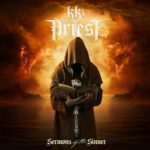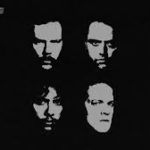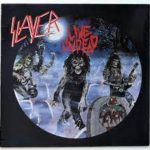Alex Skolnick – Geek to Guitar Hero Book Review
Alex Skolnick is my kind of guitar hero. Sure, I love Ozzy, Priest, and Maiden, but Thrash was the metal of MY generation. Long after the mainstream success of Metallica, it’s hard to remember that Thrash was once an underdog genre lacking legitimacy in both the industry and wider listening public. In the context of that truly underground movement, Alex Skolnick emerged as an unlikely hero. His expressive, melodic guitar solos helped differentiate Testament from their peers as the band defied the odds to become an internationally known act. Skolnick would eventually grace magazine covers typically featuring household names like Eddie Van Halen and Jimmy Page before disconnecting from metal to undergo a transformation into a talented jazz guitarist. As an early fan of Testament, Geek to Guitar Hero was an entertaining read filled with recollections from the glory days of the eighties, when a kid could pick up a guitar and dream of becoming a rock star.
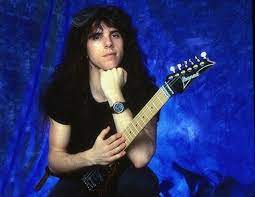
Geek to Guitar Hero is written entirely by Alex Skolnick. It can’t be understated just how rare it is for a musician to pen his own autobiography without assistance from a professional writer. Skolnick employs a conversational tone throughout the book that is easy to read. Perhaps this knack for writing is derived from his academic parents, who both loom large in the early section of Geek to Guitar Hero. Their demanding, emotionally aloof parenting style are an integral part of Skolnick’s life story. Still, as an old school Testament fan, I found myself eager to move past his childhood and glimpse into the storied history of the Bay Area Music Scene.
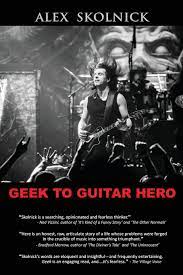
Yes, the Bay Area Music Scene. What a scene that was. Imagine being literal neighbors with the singer of Laaz Rockit. Imagine JOE SATRIANI being the local guitar teacher. Skolnick devotes a chapter to each of these formative circumstances. While Alex spends a significant portion of the book lamenting the restrictive elements of growing up in Berkeley, it’s clear this location gave him a unique advantage. After all, how many people can claim they had the same guitar teacher as Steve Vai?

It takes Alex over 100 pages before finally discussing Testament. Logically enough, that inaugural tale begins with his Legacy audition. Alex describes his apprehension about wasting his talents on a mere thrash band and only decides to audition after taking the astute advice of Joe Satriani. Testament fans will enjoy reading of an awkward drive to practice with Eric Peterson, as the two guitarists endure glaring moments of uncomfortable silence.
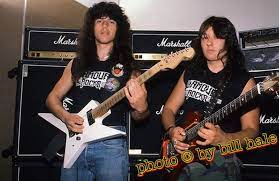
ZETRO is undoubtedly the star of the audition. Alex expertly brings Souza’s larger than life personality alive. He’s boisterous, personable, and his outgoing demeanor contrasts sharply with the two socially awkward guitarists. In fact, the chapter’s title, ‘SKULLWRECKER” is taken directly from that first meeting between this seasoned thrash vet and his newly hired gunslinger. After reading this portion of Skolnick’s book it becomes clear why Zetro was tapped to replace the incomparable Paul Baloff.
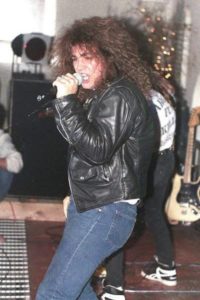
One of the more intriguing stories from Skolnick is the story of his adolescent car crash. After being pressured into making an illegal turn, a minivan collided with his parent’s meager sedan, sending our hero spiraling out in a violent spin of tangled metal and shattered glass. All occupants would emerge unscathed. Oddly enough, despite his totaled Toyota laying in a decimated heap, the stereo was unharmed as the music of Savatage wailed into the night. “Sirens/Sirens/Hungry For Man Tonight” echoed into the post-crash calm, blending in with the sound of emergency vehicle sirens rushing towards the scene.
On its own, the car crash story presents an eerie coincidence. The siren coincidence would only be half the story. Nearly a decade later, almost to the day, Skolnick would find himself in a recording studio with Savatage, filling in for their guitarist who died in a tragic car accident. The coincidences aren’t lost on Alex who openly ponders the possibility that we are guided by unseen forces that defy logic and human understanding. It’s a theme that would follow Alex throughout his book and his life. Call it destiny if you must. Cosmic forces are at work that we will never fully grasp.
The book is a treasure trove of details. We hear about the band selling drugs to fund their first demo. We get a first hand account of Zetro tearfully telling his brothers that he was quitting to sing for Exodus. We learn of their somber first meeting with famed Jonny Z……that happened to take place the day after Cliff Burton’s death.
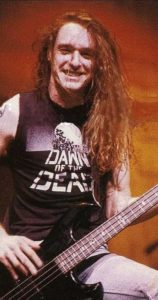
Revelations are endless. The New Order, long considered Testament’s finest hour, was written under intense pressure. The loss of Souza had created a lyricist void, plunging the band into crisis mode as the studio date loomed overhead. It was only Alex turning to books for inspiration that saved the day.
In fact, one can’t help but wonder if Testament would have collapsed entirely without Skolnick. His tasteful musical contributions of “Eerie Inhabitants,” “Hypnosis” and “Musical Death: A Dirge” provided elements of light and shade that put distance between fast paced thrash numbers. Although integral to the entire cohesiveness of The New Order, the arrangements were begrudgingly recorded to fulfill contractual obligations regarding album length. These recordings gave the album a new perspective. Fans have always equated these songs as a celebration of a confident, emerging guitar hero staking him claim. In reality, it was a desperate attempt from a shy, developing musician that found himself unwillingly placed into a highly uncomfortable situation. Not only did these new recordings push the album to the contracted 40-minute mark, but they resulted a in a unique offering that stood out from competing thrash albums.
Alex often revisits themes of fate and destiny. Uncanny coincidences are all too common to not suspect divine intervention and Skolnick’s immersion in jazz owes itself to a unique circumstance. Testament had found themselves recording Practice What You Preach at Fantasy Studios at a time when Fantasy Records acquired classic jazz labels. Alex describes discovering the sounds of John Coltrane as it was being remastered for CD, only to learn that his unique position as a studio client entitled him to free promo CDs of a nearly inexhaustible jazz catalogue. Alex would leave those sessions with well over 100 classic jazz recordings that would be the foundation of a musical awakening.
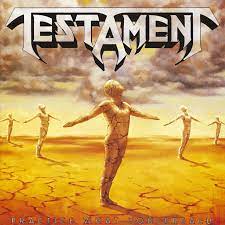
The Practice What You Preach sessions laid much of the groundwork for Alex’s musical transformation. During the recording, Skolnick recounts seeing jazz legends like Joe Pass, John McLaughlin, and Al Di Meola perform in an intimate Japanese restaurant. It was a dual education. While exploring a professional grade studio, he was also intently studying new masters outside of the typical rock guitar pantheon. Unbeknownst to his growing fan base, the steps to Skolnick eventually leaving Testament were underway.
The genesis for that departure would fully form during a tour with Stu Hamm. Alex’s invitation to audition was based on recommendations from not only Joe Satriani, but the editors from both Guitar World and Guitar for the Practicing Musician magazines. Clearly, Alex had transcended the metal underground to become a respected guitar hero. Now, with a break in the Souls of Black touring cycle, Skolnick was taking the first steps to branch out into other genres.
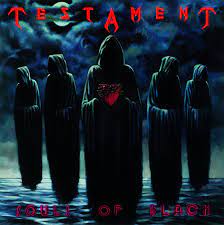
Alex recalls the feeling of transcending genre expectations. Technically, the endeavor was a step back in pay and travel accommodations. No longer a mere “metal dude,” Skolnick was sharing the stage and holding his own with guest guitarists like Steve Morse and Joe Satriani. The tour provided validation that Skolnick could branch out beyond metal, and when interpersonal conflicts continued to strain relations within Testament, Alex formally stepped away from the spotlight to plot his future.
Unfortunately, the book glosses over Skolnick’s post Testament journey. Alex briefly mentions moving to New York, being paid to record session work, studying Jazz at the university level, and releasing music with the Alex Skolnick Trio before picking up with his Testament reunion. Clearly the book was aimed at Testament fans but Alex may have underestimated the influence of his jazz pursuits. Today, Alex comes across as happy and content. Perhaps Mr. Skolnick will consider a sequel that outlines his post Testament journey into jazz and the rare achievement of personal fulfillment.


